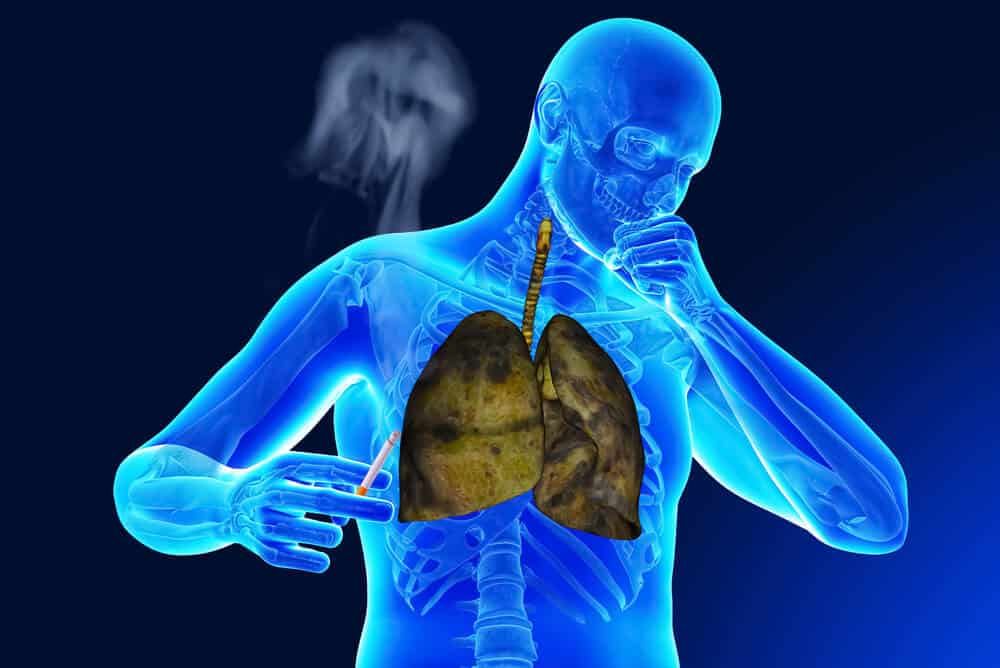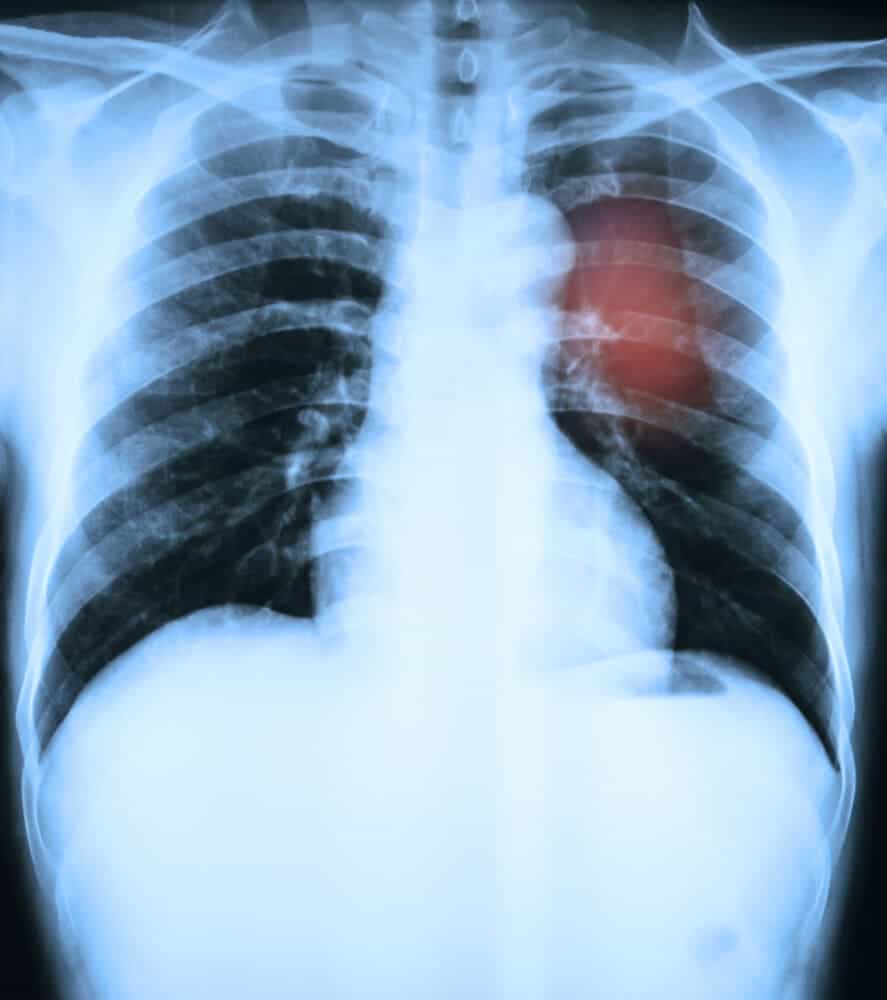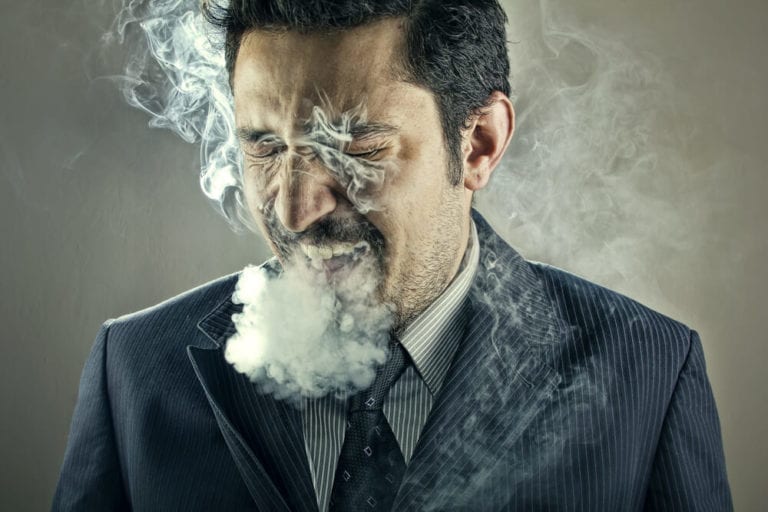Smoking and Coughing: How are Your Lungs Doing?
Many smokers experience coughing as the major side-effect of smoking. Even though coughing is quite a common issue among smokers, it doesn’t mean that one should merely pay no attention to it. On the contrary, this symptom leads to numerous respiratory complications in the long-term perspective. They include chronic obstructive pulmonary disease (COPD), widely known as smoker’s lung. It can result in lung infections, collapsed lung or even cancer.
Smoker’s cough remains one of the most recognizable features of a long-term smoker. Quite often smokers get diseases like chronic bronchitis and emphysema because their lungs are exposed to the cigarette smoke continuously. The combination of the two conditions, described above, inevitably leads to the development of chronic obstructive pulmonary disease, also known as smoker’s lung.
In this article, we will have a closer look at smoker’s cough and explain what causes smokers cough, its mechanics and consequences. You will also find information on how to stop smoker’s cough in this post.
Where does smoker’s cough come from?
 Smoker’s cough is different from the cough one gets when they catch a cold, for example. The latter disappears when the cold is over. However, smoker’s cough persists throughout the day and does not decrease over time. For this type of a cough, a cough syrup or cough suppressing pills that usually help to get rid of coughing spells when having the flu, for example, will not work. Heavy smokers with small to medium smoking record usually experience dry cough with no goop at all.
Smoker’s cough is different from the cough one gets when they catch a cold, for example. The latter disappears when the cold is over. However, smoker’s cough persists throughout the day and does not decrease over time. For this type of a cough, a cough syrup or cough suppressing pills that usually help to get rid of coughing spells when having the flu, for example, will not work. Heavy smokers with small to medium smoking record usually experience dry cough with no goop at all.
However, heavy smokers with an extended smoking record notice that their cough turns from dry to wet, and every bout of coughing produces phlegm. The color of the phlegm ranges from clear and transparent to yellow and even green. Smokers experience their worst coughing spells early in the morning as a rule.
What is smoker’s cough?
Human lungs have tiny hair-like structures that are called cilia. In normal circumstances, cilia move toxic substances through the lungs to protect them from the influence of toxins. When a person smokes, their cilia become paralyzed, and they cannot do their job. This way, toxins settle in the lungs of the person and lead to inflammation. The body searches for other ways to get rid of the toxins that it accumulates in its respiratory system. That is when coughing comes in as a natural reaction of the lungs to eliminate the smoke toxins that accumulate in the lungs.
What consequences does smoker’s cough have?
 Smoker’s cough is unpleasant to listen to, and it is much worse to experience. First of all, it is irritating and painful. Secondly, continuous intensive coughing spells lead to severe chest pain and constant lung irritation. Moreover, even if you get used to your cough and don’t pay attention to it anymore, it doesn’t mean that it does not bother people around you. It can impact your social and work life negatively, as people whom your cough disturbed are likely to start avoiding you when they can.
Smoker’s cough is unpleasant to listen to, and it is much worse to experience. First of all, it is irritating and painful. Secondly, continuous intensive coughing spells lead to severe chest pain and constant lung irritation. Moreover, even if you get used to your cough and don’t pay attention to it anymore, it doesn’t mean that it does not bother people around you. It can impact your social and work life negatively, as people whom your cough disturbed are likely to start avoiding you when they can.
And the worst part is that when you get used to experiencing constant cough and chest pain, you are likely to miss the moment symptoms intensify and do not react timely to the development of a more serious and dangerous disease, related to your harmful smoking habit. Lung cleanse can effectively help with smoker’s cough.
Chronic bronchitis
Chronic bronchitis is usually the first stage of smoker’s cough. It is different from acute bronchitis that people experience when they have a cold and completely get rid of within several weeks. Chronic bronchitis is a disease that lasts minimum three months a year for minimum two years in a row. How long does smokers cough last? As for heavy smokers, they can experience chronic bronchitis on a daily basis.
Upon waking up, the coughing spells that accompany chronic bronchitis are usually the worst. It is so because during sleep mucus accumulates in the lungs and causes much irritation at wake-up. At this point of the illness, the loss of lung function caused by chronic bronchitis is irreversible.
Over a long time of lung irritation due to chronic bronchitis, a person experiences the following symptoms (according to the American Lung Association):
– Hypernormal production of mucus
– Thickening of the airways lining
– Development of an irritating cough
– Scattering of the lungs
– Hampering of the air flow
A report, published in Every Day Health, points out that in the USA alone, over 90% of people suffering from chronic bronchitis are or have been cigarette smokers. It comes as no surprise if we remind ourselves that cigarette smoke is full of irritants and chemicals that harm the respiratory system of a smoker badly. The mucus with the toxins accumulates and leads to further health issues.
The membranes of the bronchial tubes are made of glands; they produce mucus in order to protect the airways with the help of the movements of small cilia that move the mucus throughout the airway tubes. If you put toxins in your eyes or nose, they will get irritated, and you will experience crying and sneezing because your body will be trying to get rid of the harmful substances. Same will happen when you expose your lungs to cigarette smoke – the respiratory system will produce mucus expensively to get rid of the toxins.
Smoking-induced emphysema is one more health issue smokers risk to get at some point. The bronchioles lining thickens as the production of mucus increases, and it leads to labored respiration. As bronchioles lose their elasticity, they can no longer absorb the pressure of alveoli. Further, it leads to raptures of the alveolar walls. These are the conditions of emphysema, caused by smoking. The turn alveoli lead to difficulty breathing, intensifying of the coughing spells, continuous wheezing, and chronic fatigue. This condition can also be found in non-smokers, but it is fifteen times more common in smokers.
As reported by Medical News Today, smokers with emphysema usually experience shortness of breath when engaging in activities that require physical efforts. However, as the condition develops, smokers experience shortness of breath when their activity is low or even when they are asleep. Emphysema has a lot of serious complications, most of which are not simply health-threatening, they are life-threatening.
– The patients with emphysema experience more frequent and more severe episodes of chest infections like cold, influenza and pneumonia.
– Collapsed lung or pneumothorax is a condition when lungs become so weak that they stop functioning. This condition can be fatal.
– Pulmonary hypertension is another emphysema complication that manifests itself in atypically high blood pressure in the lung arteries.
– When the pressure in the arteries connecting the heart and the lungs increases, a part of the heart expands and weakens. The condition is called cor pulmonale.
– Massive bullae develop in the lungs. They are empty spaces that can reach the size of half a lung. When it happens, bullae can catch an infection, and the surface area of the lung becomes much smaller. People with bullae are very likely to develop pneumothorax.
All the life-threatening conditions, described above, are the reasons for major concern and immediate treatment that is usually prolonged and is permanent in some rather bad cases. If yous smoking leads to one of these conditions, you will need bronchodilators, antibiotics, steroids, oxygen tanks and rehabilitation instead of your cigarettes. Surgery and lung transplantation is needed in some worst cases as well when the disease cannot be managed any other way.
Chronic Obstructive Pulmonary Disease
 Chronic Obstructive Pulmonary Disease is a combination of emphysema and chronic bronchitis. Its symptoms are chronic cough, fatigue, shortness of breath, wheezing, intense mucus production, frequent respiratory infections, and cyanosis (Blueness of the fingernail beds and lips).
Chronic Obstructive Pulmonary Disease is a combination of emphysema and chronic bronchitis. Its symptoms are chronic cough, fatigue, shortness of breath, wheezing, intense mucus production, frequent respiratory infections, and cyanosis (Blueness of the fingernail beds and lips).
Apart from structural changes that appear because of emphysema, adverse cellular changes that cause cancer can take place as well. In the outer border of the bronchial lining, there are cells that start to divide rapidly and replace ciliated cells. They are anamorphic, oversized, contain too many chromosomes and look like cancer cells in general.
If the condition is diagnosed in time and the person who smokes gives up the habit immediately, the damage can still be repaired. If a person with this condition continues smoking, the above-mentioned abnormal cells tear through the basement membrane and form a cancer tumor that spreads across the lung tissue.
Lung cancer is a scary disease that is caused by a harmful habit, that is by smoking, in 80% of the cases. Less than 13% lung cancer patients live longer than five years after they develop the condition.
Ways to Stop Smoker’s Cough
Human bodies always try as hard as they can to cure themselves, regardless of what we expose them to. For a smoker, cough is a normal reaction of the body trying to fight the toxins. Suppressing smoker’s cough with medicine will do you more harm than good since the body will not be able to perform its curing function.
If you wonder how to get rid of smoker’s cough, quitting smoking is the best answer we can give you. If, for some reason, you are not ready to quit smoking now and wonder how to stop smokers cough at least temporarily, here are the tips that can make you feel better:
– Stay hydrated. Water thins out the mucus in your throat and lungs, so drinking six to eight glasses of clear water can help you relieve smokers cough. If you develop irritated throat, try gargling with warm salty water.
– Adjust your nutrition and physical activity. Even if you have one harmful habit, it doesn’t mean you have to pick up a bunch of others and give up on your health completely.
– Elevate your head on a pillow when sleeping. It will prevent mucus draining into your throat and will make you feel more rested in the morning.
– Get some throat lozenges to relieve your throat. You can buy those with vitamins to boost your immune system.
– Mint and eucalyptus vapors naturally relieve breathing. You can either steam mont/eucalyptus leaves over boiling water or user a humidifier with the liquids that contains extracts of these herbs.
– Take a teaspoon of honey a day to soothe your throat and coughing. As a bonus, it is packed with vitamins and will boost your immune system.
Coughing after quitting smoking
People who consider quitting smoking or already did so think that the moment they stop smoking the cough will seize as well. How long does a cough last after quitting smoking in reality? Very often, when a person gives up the harmful habit, they develop another type of a cough that is a result of the body natural healing process. As the cilia are healing and growing, they are pushing the toxins out of your lungs together with the mucus. These processes cause minor irritation that makes you cough. Such a cough is nothing more than a sign that your body will be back to normal soon.
Still, if you quit smoking and the cough remains vigorous and persistent, you need to see a doctor, especially if you see blood in your mucus. Unfortunately, there are still chances that your lungs are damaged and that you have lung cancer. Even though in most cases coughing after smoking is a healthy process, you should pay attention to it and consult your doctor if it intensifies.
Regardless of the intensity of your cough, it is a good idea to see your doctor within a few weeks for a checkup when you quit smoking. Having learned the damage of your respiratory tract and the lungs, you will know what care you need to take of your health in the future.
How long does a cough last after quitting smoking? This question is hard to answer as it depends on a person’s health and the volume of toxins their respiratory system contains. In any case, consequences of smoking differ in many patients, so it is definitely a good idea to get yourself a checkup to prevent major health issues and to cure any that already occurred in a timely manner. See your doctor within several weeks after you quit smoking to make sure your body is healing and help it promptly in case it is needed.[/vc_column_text][/vc_column][/vc_row]


I am not sure of the cause of COPD in my case. I smoked pack a day for 12 or 13 years, but quit 40 years ago. I have been an outdoor person all my adult life. Coughing started last summer producing thick mucus, greenish tint to clear. I tried prednisone and antibiotics, but no change. X-rays are negative, heart lungs and blood and serum chemistries all are normal. I have lung calcification from childhood bout with histoplasmosis. I am 75 years old and retired.My current doctor directed me to totalcureherbsfoundation.com which I purchase the COPD herbal remedies from them ,they are located in Johannesburg, the herbal treatment has effectively reduce all my symptoms totally, am waiting to complete the 15 weeks usage because they guaranteed me total cure.